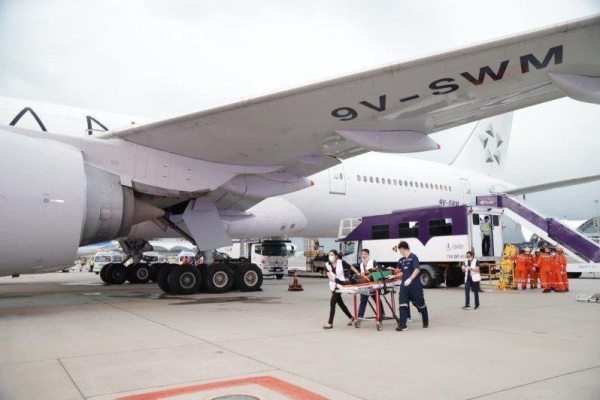
The preliminary investigation into severe turbulence aboard a Singapore Airlines flight in which a Briton died and 71 passengers and crew were injured has found the aircraft plunged 178 feet in four seconds, subjecting occupants to forces of up to 3G. Photo courtesy Suvarnabhumi Airport/Facebook
The preliminary safety investigation into severe turbulence aboard a Singapore Airlines flight in which a British man died and 71 passengers and crew were injured has found the aircraft plunged 178 feet in four seconds, subjecting occupants to forces of up to 3G.
Data recovered from the Flight Data Recorder and Cockpit Voice Recorder show the fasten seatbelt sign was switched on just 8 seconds before the Boeing 777 was hit by an updraft and then almost immediately pitched violently downwards before being catapulted upward again in rapid succession, Singapore’s Transport Ministry said in a news release. Advertisement
The Transport Safety Investigation Bureau said the first up-down movement “likely resulted in the occupants who were not belted up to become airborne” while the subsequent vertical acceleration reversal from -1.5G to +1.5G within 4 seconds “likely resulted in the occupants who were airborne to fall back down.” Advertisement
“The rapid changes in G over the 4.6 second duration resulted in an altitude drop of 178 feet, from 37,362 feet to 37,184 feet. This sequence of events likely caused the injuries to the crew and passengers,” investigators said.
TSIB investigators looking into the May 21 incident above Myanmar 10 hours into SQ321’s flight from London to Singapore are being assisted by American colleagues from the National Transportation Safety Board, Federal Aviation Administration and Boeing.
The data recorder showed that the pilots immediately “initiated control inputs” to stabilize the aircraft, disengaged the autopilot and flew the aircraft manually for 21 seconds before reengaging the autopilot.
The aircraft experienced further but much less violent surges in upward acceleration over the next 24 seconds of between +0.9G and +1.1G before settling back to its selected altitude of 37,000 feet.
The whole incident lasted just 62 seconds.
The captain made the call to divert to Bangkok’s Suvarnabhumi Airport, Bangkok after being notified by the cabin crew that people had been injured, requesting emergency medical teams to meet the aircraft on arrival.
The data showed no further severe turbulence was encountered en route to Suvarnabhumi Airport and the aircraft touched down safely 55 minutes later. Advertisement
Geoff Kitchen, 73, passed away from a suspected heart attack and 104 other passengers and crew were taken to Bangkok’s Samitivej Hospital for treatment.
The hospital said six people were treated for skull and brain injuries, 22 for spinal injuries, and 13 for bone, muscle and other injuries.
Singapore Airlines said Wednesday that it accepted the investigation team’s initial findings and that it was cooperating with the relevant authorities and pledged to meet the medical care and other costs of those who had been hurt.
“The safety and well-being of our passengers and staff are our top priorities,” it said.
“We are committed to supporting our passengers and crew members who were on board SQ321 on that day, as well as their families and loved ones. This includes covering their medical and hospital expenses, as well as any additional assistance they may need.”
The safety report comes five days after the carrier announced changes to its seatbelt policy, saying it would no longer provide hot beverage or meal service during a flight when the fasten seatbelt sign is illuminated.
NTSB data show incidents involving turbulence-related incidents are the most common type of accident in commercial aviation, but very few result in people being seriously injured. Advertisement